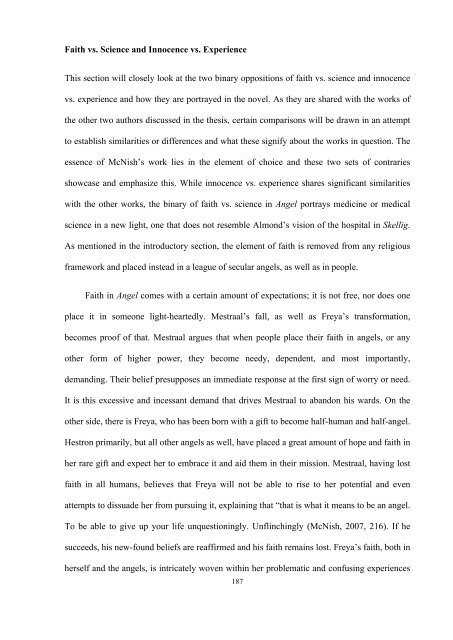The secular angel in contemporary children's literature: David ...
The secular angel in contemporary children's literature: David ...
The secular angel in contemporary children's literature: David ...
Create successful ePaper yourself
Turn your PDF publications into a flip-book with our unique Google optimized e-Paper software.
Faith vs. Science and Innocence vs. Experience<br />
This section will closely look at the two b<strong>in</strong>ary oppositions of faith vs. science and <strong>in</strong>nocence<br />
vs. experience and how they are portrayed <strong>in</strong> the novel. As they are shared with the works of<br />
the other two authors discussed <strong>in</strong> the thesis, certa<strong>in</strong> comparisons will be drawn <strong>in</strong> an attempt<br />
to establish similarities or differences and what these signify about the works <strong>in</strong> question. <strong>The</strong><br />
essence of McNish’s work lies <strong>in</strong> the element of choice and these two sets of contraries<br />
showcase and emphasize this. While <strong>in</strong>nocence vs. experience shares significant similarities<br />
with the other works, the b<strong>in</strong>ary of faith vs. science <strong>in</strong> Angel portrays medic<strong>in</strong>e or medical<br />
science <strong>in</strong> a new light, one that does not resemble Almond’s vision of the hospital <strong>in</strong> Skellig.<br />
As mentioned <strong>in</strong> the <strong>in</strong>troductory section, the element of faith is removed from any religious<br />
framework and placed <strong>in</strong>stead <strong>in</strong> a league of <strong>secular</strong> <strong>angel</strong>s, as well as <strong>in</strong> people.<br />
Faith <strong>in</strong> Angel comes with a certa<strong>in</strong> amount of expectations; it is not free, nor does one<br />
place it <strong>in</strong> someone light-heartedly. Mestraal’s fall, as well as Freya’s transformation,<br />
becomes proof of that. Mestraal argues that when people place their faith <strong>in</strong> <strong>angel</strong>s, or any<br />
other form of higher power, they become needy, dependent, and most importantly,<br />
demand<strong>in</strong>g. <strong>The</strong>ir belief presupposes an immediate response at the first sign of worry or need.<br />
It is this excessive and <strong>in</strong>cessant demand that drives Mestraal to abandon his wards. On the<br />
other side, there is Freya, who has been born with a gift to become half-human and half-<strong>angel</strong>.<br />
Hestron primarily, but all other <strong>angel</strong>s as well, have placed a great amount of hope and faith <strong>in</strong><br />
her rare gift and expect her to embrace it and aid them <strong>in</strong> their mission. Mestraal, hav<strong>in</strong>g lost<br />
faith <strong>in</strong> all humans, believes that Freya will not be able to rise to her potential and even<br />
attempts to dissuade her from pursu<strong>in</strong>g it, expla<strong>in</strong><strong>in</strong>g that “that is what it means to be an <strong>angel</strong>.<br />
To be able to give up your life unquestion<strong>in</strong>gly. Unfl<strong>in</strong>ch<strong>in</strong>gly (McNish, 2007, 216). If he<br />
succeeds, his new-found beliefs are reaffirmed and his faith rema<strong>in</strong>s lost. Freya’s faith, both <strong>in</strong><br />
herself and the <strong>angel</strong>s, is <strong>in</strong>tricately woven with<strong>in</strong> her problematic and confus<strong>in</strong>g experiences<br />
187
















